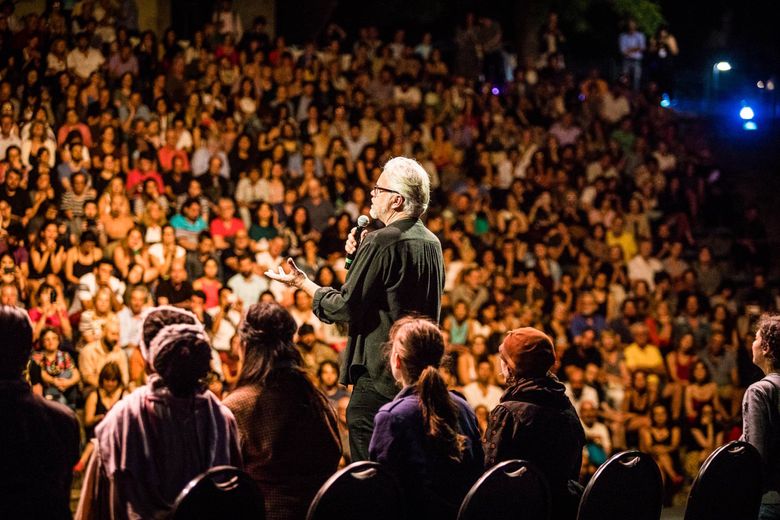By Nicole Brodeur | February 19, 2020 | 2:06 PM

There are two performances, really, during “The New Colossus,” a play directed by the actor Tim Robbins that comes to the Moore Theatre this week.
There’s the one on the stage, where 12 actors from around the world tell the stories of 12 immigrants in their native tongues and in English — stories that the actors gleaned from their own lives and ancestors, from the 1800s to present day.
And there is the performance that comes from the audience after Robbins comes out on stage to ask if anyone has indigenous blood, if any are immigrants or descendants of immigrants. Hands come up.
Where did they come from? Robbins asks. When? Why? People call out countries, dates and cities. They speak of places war-torn, oppressed and riddled with crime.
“Then I ask how many people are descended from ancestors who were brought here against their will,” Robbins said during a recent telephone interview, “and African Americans will raise their hand.”
They can’t tell what year they came, because those kinds of records weren’t kept; slaves weren’t considered people, but property, he said.
IF YOU GO
The New Colossus
Feb. 20-22 (Thursday and Friday performances at 7:30 p.m.; Saturday at 3 p.m. and 8 p.m.)
The Moore Theatre, 1932 Second Ave., Seattle
Tickets: $22.50-$42.50 (www.stgpresents.org)
Presented by The Actors’ Gang and directed by Tom Robbins
“We tend to erase histories and the histories of Africans who came here,” Robbins said. “The erasure of their cultures is a crime we have never really acknowledged, never atoned for and never accepted responsibility for.”
By that point, Robbins said, “The entire audience has raised their hands.”
The touring play — named for a sonnet by poet Emma Lazarus, which she wrote in 1883 for an exhibit to raise funds for the Statue of Liberty’s pedestal — is being performed by The Actors’ Gang, a Los Angeles-based company co-founded by Robbins in 1981.
The Academy Award-winning actor, 61, is best known for his work in films such as “The Shawshank Redemption,” “Bull Durham” and “Mystic River.”
With “The New Colossus,” Robbins is coming face to face with audiences, and doing outreach to refugee and immigrant communities, inviting all of them to tell their stories.
“All kinds of people are coming,” he said.
Out in the lobby, Robbins has set out a map that audience members can stick pins on to show where they or their ancestors are from.
“Every time we do the show,” he said, “the entire world is represented in our theater. And I’m not sure that’s possible in any other place.”
He remembered one audience member whose great-grandfather, as a boy, wasn’t allowed to enter the United States through one of its ports. He jumped overboard, swam to shore and hid out in some stables. A family found him and raised him and — according to this audience member — he became one of the founders of the Teamsters union.
“These journeys are important,” Robbins said. “Immigration defined the future for those people who had the courage and the strength to survive it.”
The hope is that in telling and asking for these stories, “The New Colossus” sheds new light on the immigration experience for those who might support Trump administration policies that aim to restrict the number of immigrants coming to the country.
“I’m sure we have had people in the audience who have been Trump voters, and I really love that,” Robbins said. “I have been welcoming of that. Because, quite frankly, if we don’t find a way to find more things that we have in common, if we don’t find a way toward unity, this is a country going off a cliff.”
At the end of the play, a title comes up on the screen: “Should we let them in?”
“We have not had anyone in the audience who has said ‘no,’” Robbins said. “The division and hate does not come from our hearts.”
Robbins believes that the theater is the best place to sort through tough issues like immigration.
“You can go to so many kinds of entertainment to distract you,” he said, referring to superhero franchises, reality TV and streaming services. “But there is not a lot of places left in the world where you can sit in the dark with people and be transported to a place in your heart where you know is there, but isn’t being affected by Marvelism.”